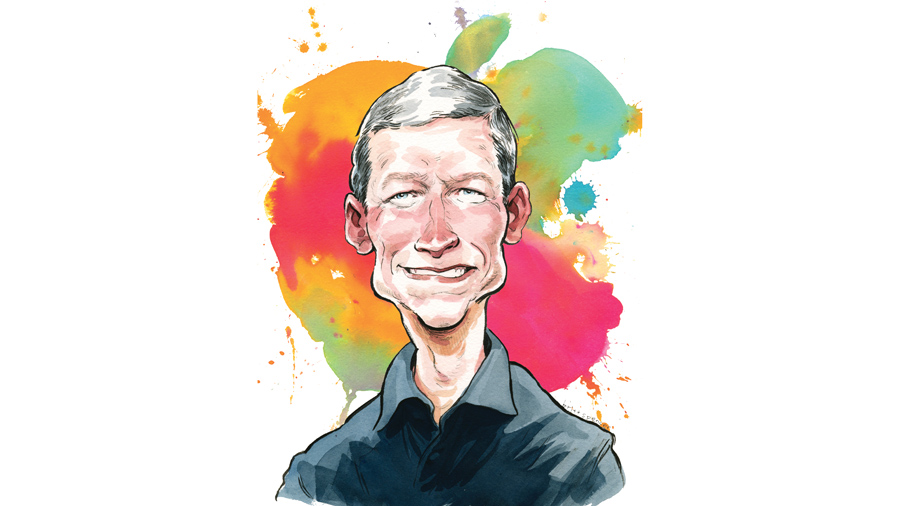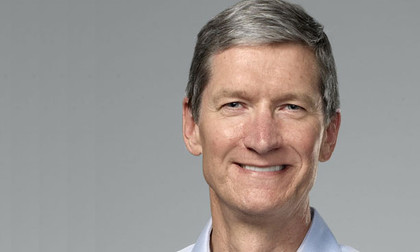Tim Cook one year on: how's Apple doing?
The head of the world's most valuable company

When Tim Cook took over as CEO in 2011, many pundits predicted the end of the company. Without Steve Jobs, they said, Apple was doomed.
Since then Apple has become even more successful. Apple fans say that's because Tim Cook is the right man for the job, the keeper of Steve Jobs' flame, but critics say he just hasn't had enough time to mess things up yet. So who's right?
Tim Cook has been with Apple since 1998. Under his watch Apple has become one of the most profitable companies the world has seen. Cook is the man who delivered Steve Jobs' promises.
Describing inventory - warehouses full of unsold kit - as "fundamentally evil", Cook subcontracted Apple's manufacturing, almost eliminating inventory and making Apple amazingly profitable. Where other electronics firms struggle with single-digit profit margins, Apple's gross margins can be higher than 45%.
Cook also negotiated deals and invested in suppliers to guarantee that when Apple needs components, it gets them - often at the expense of rivals, who can't get parts in the right quantities and at the right price. As one industry insider put it: "If it weren't for Tim Cook, the iPad would cost $5,000."
Apple might have survived without Cook, but it almost certainly wouldn't have thrived. Without his mastery of Apple's manufacturing and distribution, Apple wouldn't be shaping up to become the first trillion-dollar corporation in history.
Workaholism aside, Cook (who is known for his 4.30am emails) is very different to the man he succeeded. Cook is understated and softly spoken, a thoughtful man who's happy to share the limelight. When he unveiled the iPhone 4S, his first post-Jobs keynote, Cook delegated most of the presentation to other Apple executives. That wasn't just first-night nerves, either, as the launch of this year's new iPad was a similarly egalitarian affair.
Get daily insight, inspiration and deals in your inbox
Sign up for breaking news, reviews, opinion, top tech deals, and more.
By all accounts, Tim Cook is a very likeable man, but still has a core of steel. As CNN reports, in 1998, Cook held a meeting to discuss a problem in China. "This is really bad. Someone should be in China driving this," he said. Half an hour later, he turned to Apple's Operations Executive Sabih Khan and said: "Why are you still here?" Khan got the message and was on the next plane to China.
One thing Cook doesn't do, though, is go ballistic. Compared to him, Steve Jobs was the Incredible Hulk.
Hulk smash

While, to the best of our knowledge, Steve Jobs never turned green or smashed up a tank, his rages were famous. But were they effective? Jobs' penchant for yelling at and even humiliating staff isn't necessarily the reason Apple is so successful. It's possible that Apple thrived despite Jobs' bullying, not because of it.
There's no doubt that Steve Jobs' self-belief did Apple an enormous amount of good. It took Apple from a garage to the rich list, and Jobs' insistence on perfection meant when he demanded the impossible of Apple's engineers, they delivered it.
However, while his instincts were often right his petulant behaviour often made enemies for Apple. Apple is hated as much as it is loved, and in many cases, that's because of Jobs: the Jobs who hit out at environmentalists who said Apple could be a better corporate citizen; the Jobs who was dismissive of concerns about sweatshop labour; the Jobs whose response to genuine concerns was often to pretend they didn't exist; the Jobs who was a bully with an ego the size of a planet.
Tim Cook isn't like that, and while business isn't a popularity contest, Jobsian tantrums don't always work. Take Android, for example, a "f***ing stolen product" that Jobs vowed to wage "thermonuclear war" against. "I will spend my last dying breath if I need to, and I will spend every penny of Apple's $40 billion in the bank, to right this wrong… I'm going to destroy Android," Jobs told biographer Walter Isaacson.
So how's that war going? Samsung - one of Android's biggest cheerleaders - is now the world's biggest smartphone vendor, and Apple is losing as many lawsuits as it's winning. Jobs' war is an unwinnable one, and Tim Cook knows it.
That's why he's currently negotiating with Samsung to end the two firms' ongoing eye-for-an-eye lawsuits. Speaking to financial analysts during April's earnings call, Cook said he has "always hated litigation, and I continue to hate it… I highly prefer to settle versus battle."
That doesn't mean he's a pushover, though: "The key thing is that Apple does not become the developer for the world. We need people to invent their own stuff," he added. But unlike Jobs, he's not on an anti-Android crusade. If tit-for-tat legislation isn't helping Apple, Cook will kill it.
Writer, broadcaster, musician and kitchen gadget obsessive Carrie Marshall has been writing about tech since 1998, contributing sage advice and odd opinions to all kinds of magazines and websites as well as writing more than a dozen books. Her memoir, Carrie Kills A Man, is on sale now and her next book, about pop music, is out in 2025. She is the singer in Glaswegian rock band Unquiet Mind.
